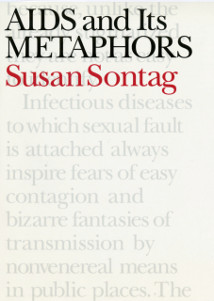AIDS and Its Metaphors
 |
|
| Author | Susan Sontag |
|---|---|
| Country | United States |
| Language | English |
| Subject | AIDS, social stigma |
| Publisher | Farrar, Straus and Giroux |
|
Publication date
|
1989 |
| Media type | |
| Pages | 95 |
| ISBN | |
| OCLC | 18167012 |
| Preceded by | Illness as Metaphor |
AIDS and Its Metaphors is a 1989 work of critical theory by Susan Sontag. In this companion book to her Illness as Metaphor (1978), Sontag extends her arguments about the metaphors attributed to cancer to the AIDS crisis. Sontag explores how attitudes to disease are formed in society, and attempts to deconstruct them.
Illness as Metaphor was a response to Sontag’s experiences as a cancer patient, as she noticed that the cultural myths surrounding cancer negatively impacted her as a patient. She finds that, a decade later, cancer is no longer swathed in secrecy and shame, but has been replaced by AIDS as the disease most demonized by society. She finds that the metaphors that we associate with disease contribute not only to stigmatizing the disease, but also stigmatizing those who are ill. She believes that the distractions of metaphors and myths ultimately cause more fatalities from this disease.
Discussing illness in metaphorical terms is not new, but Sontag says that AIDS is the ripest opportunity for "metaphorizing" in recent years. Also, because its earlier years in the United States were marked by an affliction of very specific risk groups – homosexual men and intravenous drug users – it has been stigmatized. The patient’s illness is perceived to be the patient's fault, because of the unsafe habits that one seemingly has to pursue to contract it – "indulgence, delinquency – addictions to chemicals that are illegal and to sex regarded as deviant." Having these defined subgroups created a distinction between the ill and potentially ill, and the general population.
AIDS is seen as a plague and as a judgment on the individuals suffering from it. Despite the fact that it is a heterosexual disease as well as a global issue, it is still often discussed as a consequence of decadence and a punishment for "deviant" sexual behavior.
Although HIV is likely not a new virus, its emergence changed attitudes towards illness and medicine. Infectious diseases have clearly not been as summarily defeated as society would have preferred to believe.
Generally, the many uncertainties about AIDS are the center of discourse on the illness, and reassurances that "the general population" is safe are multiplying. The judgments on the illness and the patients are still implicit in any discussion, and Sontag believes that detaching the guilt and shame from perspectives on this disease, and retiring the military metaphors from the discussion, will contribute to productive discourse on AIDS and help those who have contracted the illness.
...
Wikipedia
